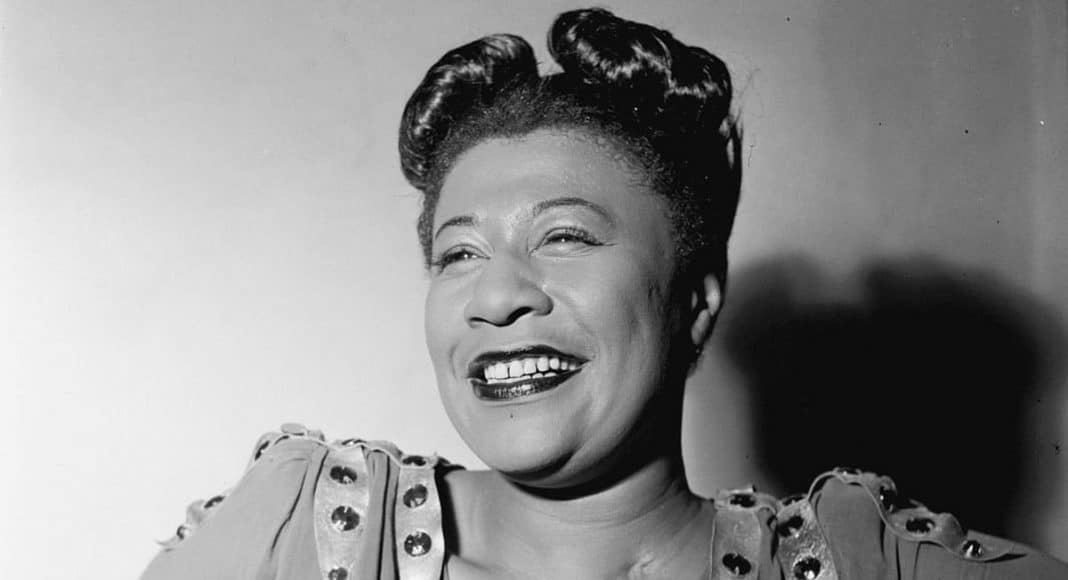“The First Lady of Song” Ella Fitzgerald would have turned 100 in April, institutions from the Library of Congress to the Grammy Museum honored her amazing contributions to the jazz canon.
It will be interesting to see if any tributes mention Fitzgerald’s “Wacky Dust,” her song about cocaine.
In the 1930s – just as Fitzgerald was getting her start – jazz was under fire for its purported ties to drug culture. The 1936 anti-drug film “Reefer Madness” featured party scenes of young people listening to jazz and ragtime while smoking marijuana. A year later, Harry Anslinger, the commissioner of the Federal Bureau of Narcotics, published “Marijuana, Assassin of Youth,” which pinned the use of drugs on a culture of unscrupulous partying – with big band jazz as its soundtrack.
-
Related Story: Could The Future Of Music Be Vinyl Records?
In this climate, an ascendant singer named Ella Fitzgerald sought to take the opposite tack and cultivated a reputation as the “girl next door.” Fitzgerald walked the fine line between being understood as a jazz artist and an entertainer. Two recordings from the beginning of her career signal this tension. “A-Tisket, a-Tasket” and “Wacky Dust” were both released in 1938. One tune would go on to become a signature hit. The other would be largely forgotten, a side note to an otherwise squeaky-clean career.
A Dressed-Up Nursery Rhyme?
By 1938, Fitzgerald had established herself as the primary vocalist for Chick Webb’s orchestra at Harlem’s Savoy Ballroom. Under Webb, Fitzgerald began recording for Decca Records and in May 1938, Decca released Fitzgerald’s first major hit, “A-Tisket, a-Tasket.”
It was a song that perfectly encapsulates Fitzgerald’s girl-next-door image. It opens with Webb leading the orchestra through a stock series of simple chord changes. When Fitzgerald enters, listeners are treated to a reworked nursery rhyme that asks little of them other than to sit back and enjoy. There is no moral value, no hint of the singer’s inner life and no mention of drug use.
In fact, “A-Tisket, a-Tasket” is barely jazz. As with Benny Goodman and so many other bandleaders in the late 1930s, Webb and Fitzgerald seem more interested in creating a pop tune that fit the 78 RPM format than in staying true to their genre. Yet it became so popular that she and Webb recorded a follow-up track, “I Found My Yellow Basket,” that same year.
But then – just a few months after “A-Tisket, a-Tasket” – Webb and Fitzgerald recorded “Wacky Dust,” a song about the allure and dangers of cocaine use.
Ella’s Reefer Song
How Fitzgerald moved from a nursery rhyme to a song about cocaine says more about jazz culture than it does Fitzgerald’s own tastes. And while songs about drugs were common in jazz, “Wacky Dust” put Fitzgerald in the awkward position of recording a song that ran contrary to the image that she was trying to cultivate.
The release of “Wacky Dust” coincided with a massive shift in cultural opinion taking place in the U.S. about the use of drugs like cocaine and marijuana. Once a relatively uncontroversial social issue, drug use in the 1930s increasingly came to be seen as a societal ill that was especially (and incorrectly) tied to African-Americans and jazz musicians. Even sympathetic artists couldn’t help but buy into the stereotype. George Gershwin’s operatic adaptation of DuBose Heyward’s novel “Porgy,” for example, was revolutionary for its diverse cast, but the story, written and adapted by two men of European descent, reinforced the popular perception of prevalent drug use among African-Americans.
Jazz artists in the early 1930s didn’t do much to help this view. Just as big band jazz was coming to dominate the music scene, two of the era’s biggest names released songs with direct references to drug use.
-
Related Story: Science: Music Turns You On In The Same Way As Sex And Drugs
In 1933, Cab Calloway’s “Reefer Man” was used in the film “International House.” A year later, Benny Goodman released “Texas Tea Party,” a reference to both marijuana and to the trombonist on the recording, Jack Teagarden. These were not subtle works, and most jazz artists of the era produced what have since become known as “reefer songs.” Even Louis Armstrong – who, like Fitzgerald, cultivated a rather benign image – was arrested for smoking marijuana and recorded several tunes that allude to drug use.
So when “Wacky Dust” was released, the idea of one of the great New York City house bands recording a jazz tune about drugs wasn’t all that surprising. (Fitzgerald and Webb had experimented with a similar subject a couple of years earlier with the release of “When I Get Low I Get High.”)
Like “A-Tisket, a-Tasket,” Wacky Dust opens with Webb’s orchestra. Fitzgerald doesn’t enter until nearly one-third of the way through the song. The first verse aligns cocaine with jazz and describes how easy it is for musicians to access the drug. The second verse and bridge section describe its wonders, but the final verse takes a turn, with Fitzgerald warning that the drug can’t be trusted and might kill you.
While “A-Tisket, a-Tasket” went on to become one of Fitzgerald’s signature pieces, “Wacky Dust” has faded into relative obscurity outside of specialty albums that feature songs about drug culture. And this makes sense. Fitzgerald was extremely careful about her image, and “Wacky Dust” didn’t fit. In fact, after “Wacky Dust,” Fitzgerald moved entirely away from songs that alluded to drugs.
By the 1950s, she had embarked on a recording career that displayed an unrivaled musicianship and joy for singing. Nonetheless, one has to wonder what her career would have looked like had “Wacky Dust” been the hit of 1938, rather than “A-Tisket, a-Tasket.”
By: Adam Gustafson, Instructor in Music, Pennsylvania State University
This article was originally published on The Conversation. Read the original article.


